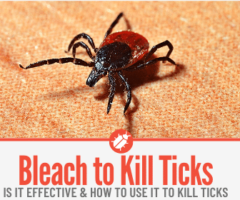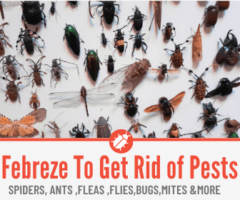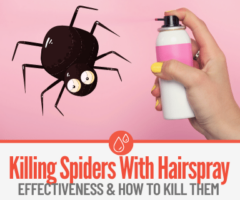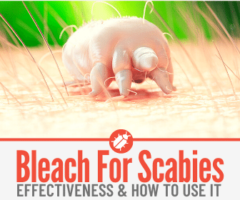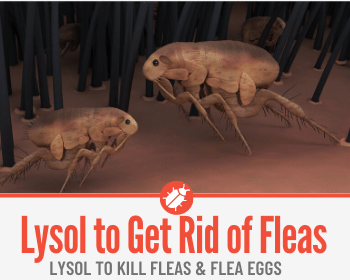 Wondering if Lysol Disinfectant Can be used to Kill Fleas? Is it even effective and can it be Used to get rid of Flea eggs too?
Wondering if Lysol Disinfectant Can be used to Kill Fleas? Is it even effective and can it be Used to get rid of Flea eggs too?
In this Guide you will Learn:
- If Lysol can be used to kill fleas and Flea eggs,
- Which Lysol Disinfectant to use and How to use it to Kill Fleas,
- If Lysol can be used to Kill Fleas on Cats or Dogs,
- Other effective ways to Get rid of fleas
Does Lysol Kill Fleas?
Yes, Lysol can absolutely be used to kill fleas.
Lysol not only is a very effective cleaning and disinfecting product, it can also be used to control flea infestation.
Fleas are parasites that survive exclusively on blood. They seek out your dogs and cats as their host and make them their blood meal.
If you have Flea Infestation, in most cases, it is extremely hard to completely get rid of them.
Although fleas don’t usually live on humans, it is possible to get bitten by them. They typically leave a cluster of bites that tend to be very itchy.
How Does Lysol Affect Fleas?
Lysol is advertised as a disinfectant spray that kills 99.9% of viruses and bacteria, but it also contains ingredients that fleas hate such as ethanol and several chemicals that act as antiseptic.
Compared to a regular insecticide that is designed specifically to kill insects, Lysol can do both, help get rid of fleas and freshen up your home!
However, when comparing to regular insecticides, Lysol will be considerably less effective.
Best Lysol for Killing fleas
The type of Lysol product to use depends on the location where you have the flea infestation.
If you can see the fleas moving around, Lysol spray in a can is the most convenient to use.
However, it won’t do its job if not directly sprayed on them.
Alternatively, some house owners also use Lysol Liquid Concentrate. Just put in a spray bottle and add water to it, then you’re all set.
It can be used like the regular Lysol Disinfectant Spray.
Most homeowners that have trouble with fleas, claim it to be more effective.
There are also people who say that Lysol Dual Action Wipes can do magic too.
They said that fleas die instantly and get trapped in the fibers of the wipe when patted directly on them.
This also makes disposal more convenient too.
How to Use Lysol to Kill Fleas in your Home
Getting rid of fleas is possible, but not as easy as you think. It’s a multistep process and requires a lot of patience.
Here are the steps you can follow to kill fleas with the help of Lysol:
- Determine the areas in your house that are most likely infested.
- Use Lysol Disinfectant Spray and directly spray it on the fleas you see moving around.
- Spray on the surfaces and furniture to kill the newly hatched eggs.
- For the rugs and carpets, put 2 cups of Lysol multi-action cleaner and grab a good scrubber.
- Wash the beddings with Lysol Laundry Detergent and hot water, especially your pet’s bed.
- Repeat the steps as often as possible to get better results.
Can Lysol be used to Get rid of Flea eggs?
Spraying on the surfaces and furnitures may only help kill newly hatched eggs and adult fleas.
In terms of destroying the flea eggs, it hasn’t been proved that Lysol can help.
Getting rid of the eggs is a lot harder than killing the adult fleas. All your efforts to kill them will be meaningless if there are still flea eggs lying around your house.
Some house owners claim it does destroy the eggs by combing Lysol with hot water, while some say it does not help at all.
Lysol for Pets
Probably one of the reasons why your house has been infested with fleas is because your beloved pets brought them home.
However, Lysol Shouldn’t be used on pets!
Lysol may contain several ingredients that fleas hate, but it also contains chemicals that are harmful to your pets.
Can Lysol Disinfectant Spray be toxic to Dogs?
Yes! Just like in other household cleaning agents, phenols can be found in Lysol. It can instantly kill viruses and bacteria, but it is also highly toxic to your dogs.
If your dog or cat comes in contact with Lysol, or even worse, ingests it, you will have to contact the Vet immediately.
Dogs can have severe oral and gastric ulceration due to the toxic components found in lysol, which can even lead to the death of your dog.
Lysol For Cats
Cats are even more sensitive to this toxic component. Even just a tiny bit of amount absorbed through their skin can be risky for them.
Lysol can cause serious damage to cats’ liver.
It is best to visit the nearest vet in your area to ask for help if your dogs or cats have been infested with fleas.
Safety Tips if you are Considering using Lysol to Kill Fleas
On all occasions, it is better to be safe than sorry. Follow these safety tips if you are considering using Lysol to kill fleas:
- Make sure to read and follow the label instructions first before using Lysol Disinfectant Spray or any products.
- Avoid getting it on your eyes or any part of your body.
- Do not spray it anywhere near your pets.
- If you have children at home, keep it away from their sight.
- Store it in a place where pets and children can’t reach it.
- Do not remove the label or mix it up with different products to avoid accidents.
More Effective Ways to Kill fleas when Compared to using Lysol
Even if Lysol did not work for you, don’t lose hope yet! There are still several alternatives to help you get rid of those fleas.
Most of these can also be found in your home.
A very effective method is to use bleach to kill fleas.
Some people use dish soap and warm water mixture to create a flea trap. You just have to fill a plate or a bowl with warm water and add a generous amount of dish soap into it.
Then you can go ahead and place it anywhere in the house where you think fleas are actively roaming around.
Others also use salt and baking soda before they vacuum the house. For better results, it is recommended to let it sit for about 24 hours or more before you crank up the vacuum cleaner.
Note: Do not forget to empty your vacuum cleaner’s contents outside after doing it.
Rosemary may not directly get rid of fleas, but it can help to prevent them. It is only an example of many natural repellents you can use.
Rubbing alcohol can kill adult fleas. However, it is toxic to animals.
Lemons are very helpful when it comes to cleaning, and it can also be used to get rid of fleas too. Just boil some water with thin slices of lemon in it and let it sit overnight.
Transfer it in a spray bottle and you can already use it the next day to spray on the infested areas in your house.
Other examples of flea-repelling plants are lavenders, chrysanthemums, eucalyptus.
These flea-repelling plants, unlike Lysol, are safe for your dogs and cats.
Some people also buy insect foggers/bug bombs.
Just make sure you are out of your house for 2-4 hours after you activated it.
In Conclusion
In many cases, Lysol and other products can only help in the early stage of flea infestation.
If you think the flea infestation is already too severe for home remedies, you might need some help from professionals.
Luckily, there are professional pest control companies that can help you get rid of fleas and prevent them from coming back.


